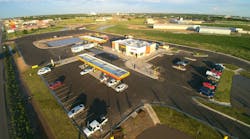So how bad is the truck parking problem in the U.S.? Well, that depends on who you ask. Some truck drivers say it’s impossible to find parking spots on a daily basis; others say it’s easier than many think, especially if you use technology to help find open slots.
But then that’s part of the truck parking issue: there’s a lot of anecdotal evidence about the problems finding available spots, there are state-level reports delving into the issue, but efforts to craft a single “big picture view” of where the trouble spots are proving difficult to a degree.
That’s one reason why mobile app developer TruckerPath took it upon itself to compile a report analyzing the truck parking problem from a driver’s perspective.
[If you’d like to download a copy of TruckerPath’s report, click here.]
Based in part on 5.5 million data points crowdsourced through its service along with a survey of 3,300 truck drivers that are members of its online community, TruckerPath’s report highlights how much the problem is costing drivers and fleets, along with other negative “side effects” being generated by this issue.
Ivan Tsybaev, founder and CEO of mobile app TruckerPath, noted in the report that finding safe truck parking for drivers is a “critical issue plaguing the trucking industry, affecting driver earnings, safety, earnings and productivity, while also affecting fleet revenues.”
Based on his company’s data analysis, Tsybaev said “it’s nearly impossible for a driver to find parking within 45 minutes during evening hours.”
He also noted that, based on TruckerPath’s research, many drivers lose an estimated 11 hours per month searching for truck parking, which amounts to around $600 in lost wages and an additional loss of $60 in profit for the fleet. That’s about $8 million annually for a fleet of 1,000 drivers.
TruckerPath also discovered that 79% of drivers it polled are forced to violate hours of service (HOS) rules because they could not find parking.
[To view a slide show illustrating more of the data points associated with TruckerPath’s study, click here.]
I talked with Sam Bokher, head of marketing for TruckerPath, about why the company felt the need to delve so deeply into the truck parking problem by crafting such a detailed report.“All sorts of government agencies are trying deal with this problem, but there’ a real lack of data about it,” he told me. “We know there is a capacity problem; the question now is where to build capacity that will best address the issue.”
That’s why TruckerPath’s report overlays its data on top of a roadway map of the U.S., illustrating where the “trouble spots” for truck parking are – and those “trouble spots” are mainly in western states, believe it or not.
“We’re trying to take a ‘holistic view’ with this data so we can maximize the impact of capacity additions,” Bokher added.
Forcing drivers to search for parking – 61% in the survey said they spent an hour a day doing so – not only reduces “equipment utilization,” he said, but “creates economic impacts for motor carriers, freight brokers, and shippers.”Bokher also stressed to me that this isn’t just about reducing the economic costs associated with lost productivity and fuel wasted in the search for parking. It’s also about driver safety – a point addressed in part by Jason’s Law passed by Congress five years ago, he noted.
For example, TruckerPath’s survey found that 74% of the drivers it polled said they park on the road shoulders of highways if truck stop or rest area parking isn’t available, while 39% park on highway off ramps and 32% use retail store parking lots.
That’s exposing them to risks – and not just to life and limb. Due to the lack of safe parking and being forced to stop overnight at “unauthorized Locations” that are not monitored, TruckerPath’s survey found that 19% of the truck drivers it polled said their personal belongings were stolen from their truck.
And that’s before the threat of cargo theft is rolled into the picture: a $35 billion to $40 billion annual problem in the U.S., according to the Federal Bureau of Investigation (FBI).
Thus with so many issues tied to the truck parking problem, it is TruckerPath’s hope that the data it can generate will be tapped by government agencies and others to help pinpoint the areas most afflicted by shortages so they can be tackled first.
“We want to use this report to increase awareness about the truck parking problem and also have interested parties come to us for the data to help solve this issue,” Bohker told me.
Thus let’s hope that we might soon be at the beginning of the end of the truck parking issue.






